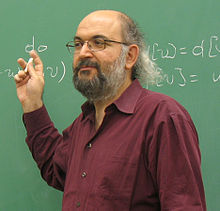Mihalis Yannakakis
| Mihalis Yannakakis | |
|---|---|

Mihalis Yannakakis
|
|
| Born |
13 September 1953 Athens, Greece |
| Nationality | Greek-American |
| Fields | Computer Science |
| Institutions | Columbia University |
| Alma mater |
National Technical University of Athens Princeton University |
| Doctoral advisor | Jeffrey Ullman |
| Notable awards | Knuth Prize (2005) |
Mihalis Yannakakis (Greek: Μιχάλης Γιαννακάκης; born 13 September 1953 in Athens, Greece) is Professor of Computer Science at Columbia University. He is noted for his work in computational complexity, databases, and other related fields. He won the Donald E. Knuth Prize in 2005.
Yannakakis was born in Athens, Greece in 1953 and attended Varvakeio High School for his early education. He graduated from the National Technical University of Athens in 1975 with a diploma in Electrical Engineering, and then earned his Ph.D. in Computer Science from Princeton University in 1979. His dissertation was entitled "The Complexity of Maximum Subgraph Problems".
In 1978 he joined Bell Laboratories and served as Director of the Computing Principles Research Department starting from 1991 until 2001, when he left Bell laboratories and joined Avaya Laboratories. There he served as Director of the Computing Principles Research Department until 2002.
In 2002 he joined Stanford University where he was a Professor of Computer Science, and left in 2003 to join Columbia University in 2004, where he is currently serving as the Percy K. and Vida L. W. Hudson Professor of Computer Science.
From 1992 to 2003, Yannakakis served on the Editorial board of the SIAM Journal on Computing and was the Editor-in-chief between 1998 and 2003. He also was a member of the editorial board of the Journal of the ACM from 1986 to 2000. Other editorial board memberships include the Journal of Computer and System Sciences, the Journal of Combinatorial Optimization, and the Journal of Complexity. He has also served on conference committees and chaired various conferences, such as the ACM Symposium on Principles of Database Systems and the IEEE Symposium on Foundations of Computer Science.
...
Wikipedia
